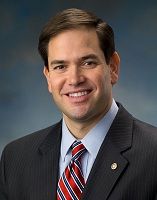Article
Presidential Candidates on Health Care Issues: Marco Rubio
Author(s):
Part of an ongoing series that takes a high-level look at the positions of the leading nominees for President when it comes to political issues potentially impacting physicians, this installment focuses on Marco Rubio.
Over the next few weeks, we’ll take a high-level look at the positions of the leading nominees for President when it comes to political issues potentially impacting physicians.

Florida Senator Marco Rubio is currently running third in the Republican race, behind Donald Trump and Ted Cruz, but his campaign is picking up steam thanks to polished performances in the debates and a consistency of message the other candidates sometimes lack. Rubio was running well ahead of his former mentor, Jeb Bush, when the latter dropped out of the race following yet another dismal showing in a state primary. Rubio is one of the few Republican candidates to push beyond simply decrying the Affordable Care Act (ACA) and suggest an actual alternative. But how fleshed out is that alternative, and what does it look like?
Overall: Rubio’s main issue with the ACA, besides the general party line that it increases the role of government, is that it potentially limits access to physicians and insurance plans and puts a strain on the economy at large‑‑and, in particular, on small businesses. “ObamaCare is fatally flawed not just because it is poorly constructed, but because it relies on the outdated philosophy that the federal government can solve our problems through more spending, more taxes, more regulations, and more bureaucrats,” Rubio wrote for Politico. “...When I am president, repealing and replacing ObamaCare will be an urgent priority of my administration. Instead of relying on an outdated, big-government approach, I will utilize modern, consumer-centered reforms that lower costs, embrace innovation in healthcare and actually increase choices and improve quality of care.”
Those proposed changes take the form of refundable tax credits that would be used to purchase health insurance; reformed insurance regulations to lower costs, encourage innovation, and protect the vulnerable; and strengthening Medicare and Medicaid by placing them on fiscally-sustainable paths. Those are worthy ideas, but cutting costs while expanding access has proven a difficult challenge for every politician who has tried to tackle the US health care system. For the moment, they remain more core concepts than a specific action plan, although Rubio has provided some detail around how he would invigorate Medicare.
Abortion: Rubio is staunchly pro-life, even in cases in which conception resulted from rape, or in cases in which the mother’s life could be in danger. “I personally and deeply believe that all human life is worthy of the protection of our laws,” he told NBC’s Meet the Press. “And I believe that irrespective of the conditions by which that life was conceived, or anything else, and for me to be consistent on that belief.” He did, however, support the Pain-Capable Unborn Child Protection Act in 2013, which aimed to ban late-stage abortions but would allow it under some circumstances. He denies inconsistency here, saying while he doesn’t support exceptions, he does support legislation that would lead to the overall result of fewer abortions.
Other issues: Regarding Medicare and Social Security, Rubio differs from some of the GOP candidates in that he believes strongly that both programs should be maintained and strengthened. He does not believe in any changes for those in or near retirement. He has suggested transitioning Medicare to a premium support system that would give seniors a generous but fixed amount with which to purchase health insurance. Seniors would have the option of either Medicare or a private provider.





